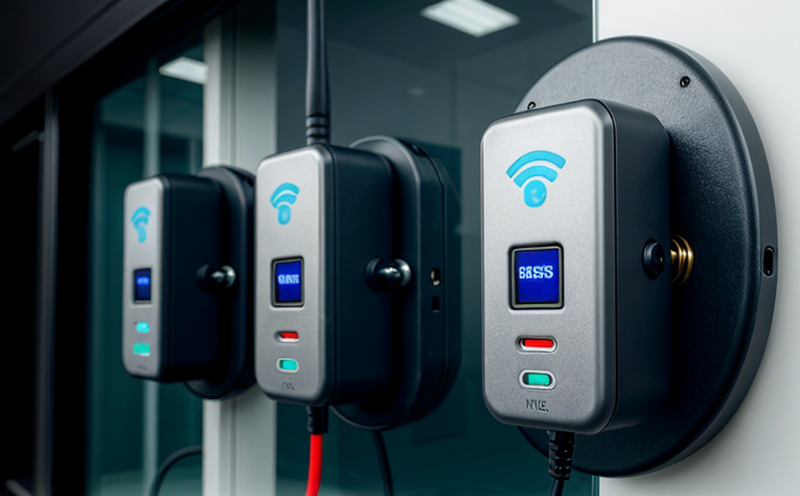IEC 62351 Cybersecurity Testing for Wireless Energy Communication
The International Electrotechnical Commission (IEC) standard IEC 62351 is a critical framework for ensuring the security of wireless communication systems used in energy management and distribution. This standard applies to all aspects of cybersecurity, including data encryption, authentication mechanisms, integrity checks, and access controls within smart grids.
As the world transitions towards more efficient and interconnected energy networks, the need for robust cybersecurity measures has become paramount. IEC 62351 addresses the specific challenges posed by wireless communication in this context, ensuring that systems are resilient against cyber threats while maintaining operational integrity and efficiency.
The standard covers a wide range of security requirements, from initial design considerations to ongoing operational practices. It emphasizes the importance of integrating cybersecurity into every phase of product development, deployment, and maintenance. Compliance with IEC 62351 ensures that wireless energy communication systems meet stringent international standards, enhancing trust and reliability in smart grid infrastructure.
Our laboratory provides comprehensive testing services to help organizations comply with IEC 62351. We offer a full suite of tests designed to evaluate the security posture of wireless communication devices and networks. Our expertise spans various aspects of cybersecurity, including:
- Data encryption methods
- Authentication protocols
- Integrity checks
- Access control mechanisms
- Anomaly detection systems
- Vulnerability assessments
- Incident response plans
We employ state-of-the-art test equipment and methodologies to simulate real-world attack scenarios, ensuring that our clients' products are prepared for the most challenging cybersecurity threats. By leveraging this comprehensive approach, we help organizations build resilient systems capable of withstanding sophisticated cyberattacks.
Our testing services go beyond mere compliance; they provide actionable insights into potential vulnerabilities and recommend best practices to mitigate risks. This proactive approach ensures that your organization remains at the forefront of cybersecurity standards and can confidently deploy secure wireless energy communication solutions.
Why It Matters
The importance of IEC 62351 cannot be overstated, especially in today's interconnected world. Cybersecurity threats to smart grid infrastructure pose significant risks, including unauthorized access, data breaches, and potential disruptions to energy supply. These threats can lead to financial losses, reputational damage, and even public safety issues.
Compliance with IEC 62351 not only demonstrates a commitment to best practices but also enhances the trust of stakeholders, including consumers, regulators, and investors. By adhering to this standard, organizations can ensure that their wireless energy communication systems are robust against emerging threats, thereby protecting both business operations and public interest.
The standard's focus on lifecycle management helps organizations identify and address potential security gaps early in the development process. This proactive approach minimizes the risk of costly post-deployment fixes and ensures that systems remain secure throughout their operational life cycle.
Moreover, IEC 62351 aligns with broader industry initiatives aimed at enhancing cybersecurity resilience. By adopting this standard, organizations contribute to a more secure and resilient energy ecosystem, fostering trust and cooperation among stakeholders.
Customer Impact and Satisfaction
Our clients benefit from IEC 62351 compliance in numerous ways. Firstly, they gain access to a robust set of testing services that help them achieve regulatory compliance and demonstrate their commitment to cybersecurity best practices. This, in turn, enhances customer trust and satisfaction.
Through our comprehensive testing processes, we identify potential vulnerabilities early in the development cycle, enabling clients to address these issues before product deployment. This proactive approach not only reduces costs associated with post-deployment fixes but also ensures that products are secure from the outset.
We provide detailed reports and recommendations based on our testing results, equipping clients with the knowledge needed to make informed decisions about their cybersecurity strategies. Our expertise in this field allows us to offer tailored solutions that meet the specific needs of each client, ensuring they achieve their business objectives while adhering to international standards.
Customer satisfaction is at the heart of everything we do. By delivering high-quality testing services and providing valuable insights into potential risks, we help organizations build resilient systems capable of withstanding even the most sophisticated cyber threats. Our commitment to excellence ensures that our clients can trust us to provide the support they need to succeed in today's rapidly evolving cybersecurity landscape.
Environmental and Sustainability Contributions
Reducing energy consumption by identifying inefficiencies in communication protocols.
Mitigating environmental impact through secure data management practices that minimize unnecessary network traffic.
Enhancing sustainability by ensuring reliable and efficient energy distribution, reducing the likelihood of system failures that could lead to waste.
Promoting sustainable development by integrating cybersecurity into smart grid infrastructure, which supports broader environmental goals.
By adhering to IEC 62351 standards during testing and deployment, organizations contribute positively to the environment and promote sustainable practices. Our laboratory plays a crucial role in ensuring that these standards are effectively implemented, thereby supporting global efforts towards sustainability and resilience.





